Carmen – 2017- Lyric Opera of Chicago
New Lyric Opera Copraduction with Huston Opera.
Music by Georges Bizet.
Opera in four acts in French.
Libretto by Henri Meilhac and Ludovic Halévy,
after the novella Carmen by Prosper Mérimée (1845).
Conductor: Harry Bicket.
Director & Choreographer: Rob Ashford.
At the Lyric Opera of Chicago.
The gypsy Carmen tells her friend that love is “a wild bird that cannot be imprisoned.”
Fluid music, fine staging with creative dance and movement mark a splendid acted and sung Carmen.
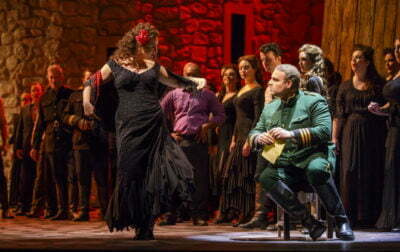
After seeing various productions of Carmen through the years, I must admit that the production I saw this season at the Lyric Opera of Chicago was both the finest Carmen I have seen to date and that Carmen quickly enshrined itself as my ‘all-time’ favorite opera! Bizet’s Carmen has it all: memorable music including haunting arias and rhythmic marches; terrific characters and romance with empathetic plot and a painful tragedy. To me the 3 hours flew by!. I can’t think of a better opera to introduce newbies to opera.
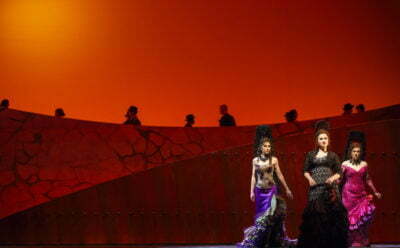
Bizet’s 1875 Carmen never gained him many accolades because he died after only 13 performances into the Paris debut. The story revolves around a Spanish gypsy (the wild free-loving Carmen, played seductively by mezzo-soprano Ekaterina Gubanova) and the man she takes as a lover, a Spanish corporal, Don José (The powerful tenor Joseph Calleja). He is an upright but flawed man, with a mother and would-be fiancée in his home village; quick to temper and impulsive, when he shirks the advances of the beautiful gypsy, she finds him irresistible and throws a rose at him, striking him between the eyes. Having bewitched him, Carmen convinces Don José to go to prison in her stead; upon his release, he finds her, and she wants to run away together. They do, after a confrontation with Don José’s commanding officer results in his forced desertion. While traveling in their band of smugglers, a famous toreador finds them, and convinces Carmen to leave the corporal for him. Don José, learning of his mother’s ailing health, begrudgingly leaves, swearing to find Carmen once again. He finds her in a procession entering the Seville bullring, and, when she refuses to come back to him, he kills her.
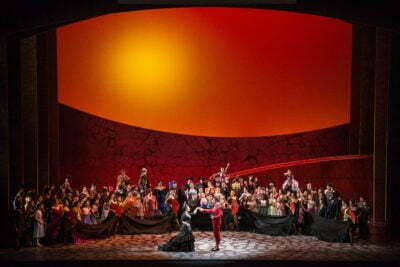
The raw passion and sensuality on display – and the realistic portrayal thereof, which helped fuel the verisimo movement in opera – might have upset Carmen’s first audience, but it is one of the reasons this piece not only endures but is ranked among the world’s greatest and most oft-performed operas. The emotions of Bizet’s characters are very natural. He describes the love of Carmen precisely as quite passionate Bizet understood the emotion better than most other artists – than most other people: “They believe one becomes selfless in love because one desires the advantage of another human being, often against one’s own advantage. But in return for that they want to possess the other person.” Don José, undeniably, is the embodiment of that love. Indeed, of all love – for every one of us knows that possessiveness, to one degree or another.\
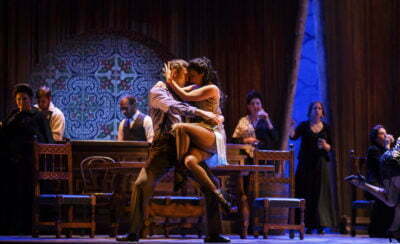
Bizet’s Carmen focuses not on great men, but on the people – indeed, on rascals. The population of Bizet’s work is not full of paragons of good and evil, but of normal people living and trying to survive. Instead of walking over the common man, telling him to behave as the composer wishes, Bizet makes the common man his subject – and thus makes his work much more democratic than his contemporaries.
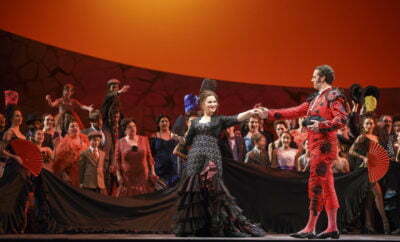
And at the center of this is the gypsy prostitute Carmen. Some people see her as evil – both Micaëla ( Lindsay Metzger) and Don José compare her with Satan, and audiences sometimes agree – but they fail to see the purity and innocence that she embodies. She is a pure sensational woman who relishes her freedom.
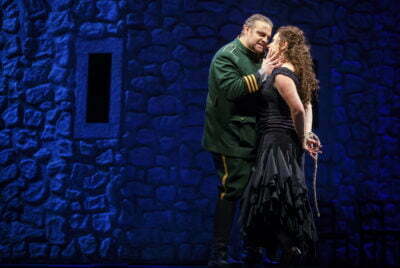
In her first song, the famous Habanera L’amour est un oiseau rebelle, she tells the guards to beware if she loves them. Does she ever promise Don José that she’ll be with him with him forever? As the toreador Escamillo (Christian Van Horn) tells Don José, her affairs seem to last only six months. But that is because her passions are so much more intense than a normal person’s that no one is able to endure. She elevates the passions of the men she seduces, but none are able to sustain her: she is too alive, to overfull, for them to match her. It is only Don José that she is able to raise to her level of passion – and because he is not like her, because he is only human, all-too-human, he is driven mad by this excess of passion, so out of necessity, out of self-preservation, he kills her. Moreover, she cannot survive in a world in which no one is as alive as she is. Her passions are too strong for society, and so society’s rules do not apply to her. She is, perhaps, a reevaluation of values. Certainly she does not let society ever get in the way of her freedom.
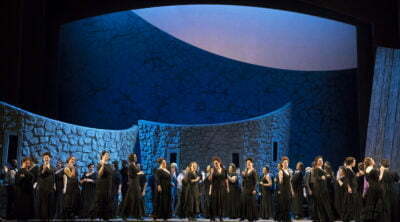
She is going to prison, she convinces Don José to let her escape; she is fired at the cigarette factory, she finds another job; she is becoming ensnared by one lover, she leaves and finds another. And once she predicts her own death, she refuses to be controlled by it, facing Don José, telling him she is not afraid of dying by his hand; which, indeed, she does – and is perhaps given the ultimate freedom. For when dead, society will never be able to entrap her.
In the Lyric production, director/choreographer Rob Ashford uses dance and symbolic movement to replace the traditional marches to terrific effect. The chorus and the Chicago Children’s Choir both sang and danced with grace and precision. Ekaterina Gubanova was fantastic as the sensual gypsy both in her vocals and her deft acting. Joseph Calleja’s rich tenor exuded his angst and longing.
From the opening, this production of Carmen grabs us and takes us on a melodic journey with a remarkable woman utilizing the grand music of Georges Bizet. Carmen can still thrill opera patrons as well as reinvigorate its fans. Kudos to the Lyric opera of Chicago for offering such a fine production.
Highly Recommended.
Tom Williams.
Date Reviewed: February 22, 2017.
For more info checkout the Carmen page at theatreinchicago.com.
At the Lyric Opera of Chicago, Civic Opera House, 20 N. Wacker Drive,
ends on March 25, 2017, for tickets, call 312.827.5600 or visit Lyric Opera, Tickets: $20 – $349
Info: (312) 827-5600; Run time: Three hours with one intermission.
ends on March 25, 2017, for tickets, call 312.827.5600 or visit Lyric Opera, Tickets: $20 – $349
Info: (312) 827-5600; Run time: Three hours with one intermission.

